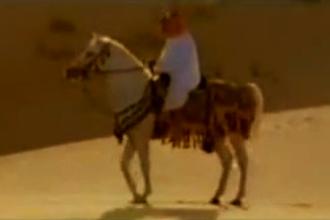| Home Horse Breeds | First Posted: June 25, 2013 Jan 21, 2020 | |
Arabian Horses and Bedouins"And Allah took a handful of southerly wind, Arabian Horses and the Bedouin
Bedouin and his horse
The Arabian horse is considered the oldest breed of all time dating several millennia. Its origins have been traced to the desert region of the Nejd in the Arabian Peninsula. There is archaeological evidence of horses that resemble modern Arabians dating back 4,500 years. Throughout history, Arabian horses spread around the world by both war and trade. They were used to improve other breeds by adding speed, refinement, endurance, and strong bone. Today, Arabian bloodlines are found in almost every modern breed of riding horse. The Arabic Bedouins, a nomadic tribe, have survived for millinnia (millennium-plural millennia or millenniums-is a period of time equal to one thousand years) in the harsh desert environment owing much of their survival to their relationship with the noble Arabian horse. Bedouin lore claims that the Arabian horse came from wild horses of the Nejd. According to Bedouin traditions these horses were tamed and used thousands of years before the birth of Christ. The Bedouins selectively bred for traits including an ability to form a cooperative relationship with humans. These horses were bred to be good-natured, smart, and willing to please. The Arabian also developed the high spirit and alertness needed in a horse used for raiding and war. The Arabian horse was efficient in his way of going and capable for the warhorse was principally a superior form of transportation. They were sure footed, balanced, athletic, agile and sound. Their stride was long, light and powerful with great overreach. They were fast with great endurance. Great demands were put on the Bedouin mounts both in war and in every day life. This coexistace of man and horse was a major driver for how civilization progressed. The horses were so prized by the Bedouin people that they would keep these horses inside the family tent to provide the horses shelter and protect the animals from theft. Life was difficult in the desert. Often there was little food and a scarcitiy of water for both man and beast. The daily struggle and raids were necessary to the survival of the Bedouin namads and their horses. War was ongoing and strife was unrelenting. "Death was accepted as both inescapable and inevitable." Yet, with all these difficulties the Arabian horse, through natural selection dictated by man's survival, evolved and thrived. The horse is athletic, smart and couragous. It has spirit, strength, endurance and speed. Surviving these rugged conditions the Arabian horse of the Nejd was able to survive on little food and water. They were what we call today "easy keepers." In keeping with the survival of the fittest wisdom--genetically only the horses able to survive under these harsh conditions lived. "From its origin within the cradle of civilization in the Middle East, the Arabian horse was introduced to the Western World as man's ambition drove his desire to discover and conquer realms beyond. As a vehicle of war, the Arabian horse excelled amongst equine breeds, proving superior in swiftness, courage, tenacity and fortitude. Astute horsemen were quick to recognize the superlative characteristics of the Arabian horse, seizing every opportunity to incorporate Arabian blood into native stock, the foundation of which is every major light horse breed in existence today. The most influential breeders of means, royalty and aristocracy, established purebred Arabian breeding programs, paving the way for the foundation programs of modern Arabian horse breeding such as the Royal Stud of Ali Pasha Sherif, Balance, quality, movement and disposition are to the most fundamental definitions of Arabian type. Arabian horses are intelligent, kind, willing, courageous, curious and social. They are the backbone of the equine kingdom we know today. For More Information: Arabian Horse HistoryArabian Horse Five Arabian Horse Female lines: Kuhaylan El Adjus, Siglavy, Habdan, Hamdani and Obajan Arabian or Arab Horse Breed |